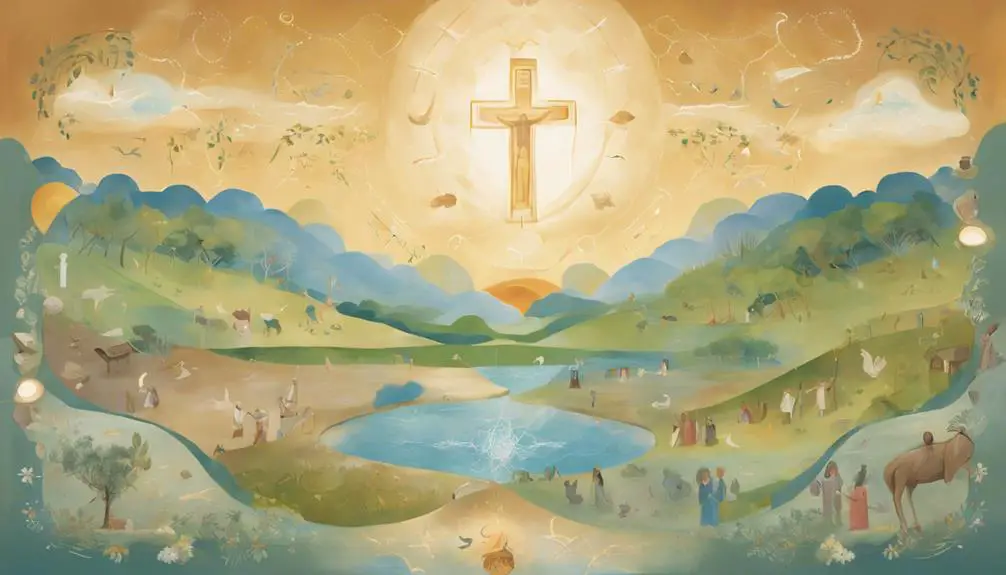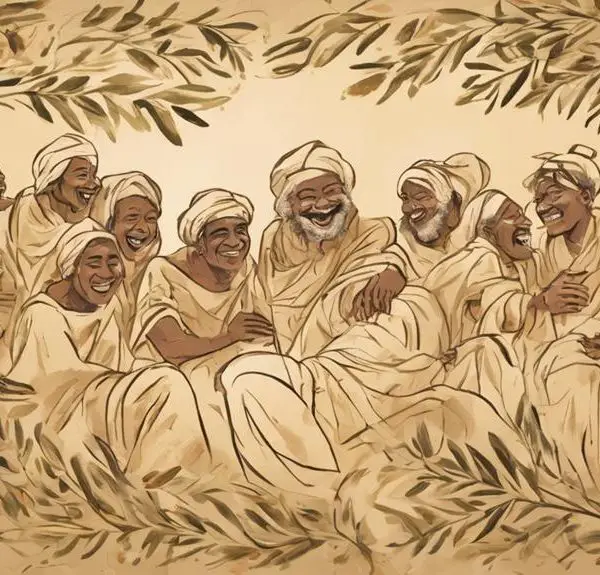Lose yourself in the Bible's spiritual dimensions, where parables and prophecies reveal a deeper divine narrative waiting to be explored.

Spiritual Dimensions in the Bible
Imagine standing at the edge of the Garden of Eden, feeling the loss of paradise with every fiber of your being. The Bible is filled with such vivid spiritual dimensions, from the prophetic dreams of Daniel to the apocalyptic visions in Revelation.
You're invited on a journey through these passages, exploring how earthly stories convey heavenly meanings, and how wisdom and worship intertwine in the Psalms. The teachings of Jesus, through his parables, offer a direct line to understanding these spiritual realms.
But what lies beyond the surface of these texts? Uncover the spiritual depths that beckon, promising a deeper connection to the divine narrative.
Key Takeaways
- The Bible uses rich symbolism to convey deep spiritual truths and moral lessons.
- It offers narratives that inspire courage and illustrate the power of faith in overcoming adversity.
- Through parables and prophetic visions, it communicates complex theological concepts in accessible ways.
- The text embodies expressions of worship, wisdom, and the struggle between light and darkness, guiding individuals towards spiritual growth and moral integrity.
The Garden of Eden: Paradise Lost

The Garden of Eden, often symbolizing mankind's lost paradise, serves as a foundational narrative in exploring the spiritual dimensions within the Bible. This story doesn't merely recount the innocence and fall of the first humans but embodies profound teachings on original sin and moral autonomy. The serpent's temptation, leading to the consumption of the forbidden fruit, isn't just a moment of weakness but a pivotal event that introduces the concept of original sin into Christian theology.
You're invited to reflect on the implications of this moment: the transition from innocence to knowledge, from undisturbed communion with the divine to a life marked by toil and moral complexity. The serpent's role is especially crucial, embodying the allure of forbidden knowledge and the complexities of free will. This narrative lays the groundwork for understanding humanity's perpetual struggle between divine commands and earthly desires, a theme that resonates throughout the Bible.
In delving into this story, you're engaging with questions about the nature of sin, free will, and the human condition—themes that are as relevant today as they were in the ancient world. The Garden of Eden story isn't just an origin story; it's a mirror reflecting humanity's deepest spiritual dilemmas.
Prophetic Visions of Daniel

Delving into the prophetic visions of Daniel unveils layers of apocalyptic imagery and divine messages that have fascinated scholars and believers alike for centuries. Within these visions, you're not just reading ancient texts; you're stepping into a world where the divine intersects with human history—particularly during the turbulent period of the Babylonian exile. Daniel's interpretation of dreams and visions serves as a beacon of hope and a reminder of divine sovereignty over empires and kings.
- The imagery of the four beasts in Daniel 7 evokes a sense of awe and terror, stirring deep reflections on the transient nature of earthly powers.
- Daniel's unwavering faith amidst the lions' den inspires courage and steadfastness in the face of adversity.
- The prophecy of the seventy weeks in Daniel 9 offers a profound sense of anticipation for divine intervention and the ultimate restoration of all things.
These narratives aren't mere historical accounts; they're imbued with spiritual significance that resonates across millennia. Daniel's visions challenge you to look beyond the immediate, to seek deeper understanding and to find hope in the assurance of God's overarching plan for humanity amidst the trials of the Babylonian exile and beyond.
The Psalms: Worship and Wisdom

As we explore the Psalms, you'll discover they serve as a profound expression of worship and a repository of wisdom, reflecting the breadth of human emotion and the depth of divine connection. The Psalms, through their musical poetry, encapsulate the emotional depth of human experiences—ranging from despair to exultation. They offer you a unique lens through which to view the complexities of a relationship with the Divine.
Theme |
Example Psalms |
|---|---|
Worship |
Psalm 95: "Come, let us sing for joy to the LORD; let us shout aloud to the Rock of our salvation." |
Wisdom |
Psalm 1: "Blessed is the one who does not walk in step with the wicked or stand in the way that sinners take or sit in the company of mockers." |
Lament |
Psalm 22: "My God, my God, why have you forsaken me?" |
Thanksgiving |
Psalm 107: "Give thanks to the LORD, for he is good; his love endures forever." |
Trust |
Psalm 23: "The LORD is my shepherd, I lack nothing." |
Through these themes, the Psalms guide you in navigating life's trials and triumphs, teaching you to voice your deepest fears and highest praises with equal fervor. In their essence, they are not just songs or prayers, but a way of understanding and living in the world, deeply rooted in spiritual wisdom and emotional authenticity.
Jesus' Parables: Earthly Stories, Heavenly Meanings

Why do Jesus' parables, with their simple earthly narratives, carry profound heavenly meanings that continue to challenge and enlighten us today? At their core, these stories utilize familiar scenes to unveil deeper spiritual truths, bridging the gap between the divine and the human experience. Through parables, Jesus communicates complex theological ideas in a manner that's accessible and relatable, inviting listeners into a reflective journey of discovery.
Take, for instance, the parable of the seed growth. It's not just a tale about agricultural practices but a vivid illustration of the Kingdom of God's mysterious, organic development within and among us. Similarly, the story of the lost sheep goes beyond a shepherd's quest, symbolizing God's relentless pursuit and joy in recovering what's lost.
- The seed's journey from germination to harvest mirrors our own spiritual growth, often unseen yet profoundly transformative.
- The lost sheep evokes a sense of belonging, reminding us that no one is too far gone to be brought back into the fold.
- These narratives stir a deep recognition of our own experiences, bridging earthly lives with heavenly hopes.
Through these parables, Jesus crafts a spiritual lens, offering insights that resonate on both personal and communal levels, guiding us toward deeper understanding and connection.
Revelation: The Apocalypse Unveiled

Moving from the metaphorical teachings of Jesus through parables, we now turn our attention to the Book of Revelation, where apocalyptic visions reveal profound spiritual truths about the ultimate destiny of the world. This text, rich in end times symbolism, challenges you to look beyond the literal to understand its deeper, spiritual significance. You're drawn into a narrative that's both daunting and illuminating, where the unveiling of the future is intricately tied to the moral and spiritual condition of humanity.
The Beast's identity, a central mystery in Revelation, serves as a focal point for reflection on the nature of evil and its impact on the world. This figure, emblematic of ultimate opposition to the divine, invites you to consider the forces at play in your own life and the wider world that stand in contrast to spiritual truth and integrity.
In analyzing Revelation, you're encouraged to see beyond the immediate imagery to the underlying messages of hope, resilience, and divine justice. It's a call to spiritual vigilance and moral fortitude, offering a vision of a future where light ultimately triumphs over darkness.
Frequently Asked Questions
How Do Modern Spiritual Practices Draw Upon the Teachings Found in the Bible, and Can They Coexist With Traditional Interpretations?
You're exploring how modern spiritual practices, like prayer meditation, draw from biblical teachings. These practices often seek divine intervention, mirroring ancient beliefs. Can they mesh with traditional interpretations? Absolutely.
The key is understanding that spirituality evolves. By reflecting on the roots found in the Bible, you're recognizing a shared quest for meaning. This blend of old and new enriches our spiritual journey, allowing both perspectives to coexist and flourish together.
In What Ways Do the Bible's Spiritual Dimensions Influence Contemporary Ethical Debates, Such as Those Surrounding Environmentalism or Social Justice?
You'll find contemporary ethical debates, like environmentalism or social justice, deeply influenced by principles that, while not explicitly linked here, resonate with biblical teachings.
Economic stewardship and technological ethics, for example, echo the Bible's calls for responsibility and wisdom. Reflecting on these, it's clear that ancient texts offer profound insights into today's dilemmas, guiding us towards solutions that balance moral integrity with modern challenges.
How Have the Spiritual Dimensions in the Bible Been Interpreted Differently Across Various Cultures and Historical Periods, and What Impact Does This Have on Global Christianity Today?
You'll find that across cultures and eras, interpretations of spiritual texts have varied greatly, influenced by linguistic evolution and cultural syncretism.
This diversity has profoundly impacted global Christianity, leading to a rich tapestry of beliefs and practices.
It reflects how different societies have woven their unique historical and cultural threads into the fabric of spiritual understanding, challenging and enriching the global Christian landscape in a way that continues to evolve today.
Can the Spiritual Teachings in the Bible Offer Insights Into Personal Mental Health and Wellbeing, and if So, How?
Absolutely, the spiritual teachings you explore can deeply impact your mental health and wellbeing. By integrating mindfulness practices inspired by these teachings, you're likely to enhance your emotional resilience.
This approach encourages a reflective, analytical mindset, allowing you to navigate life's challenges with greater ease. Essentially, these teachings offer a framework for personal growth, promoting a balanced, healthy mental state through thoughtful reflection and practice.
How Do Non-Christian Religions and Belief Systems View the Spiritual Dimensions Found in the Bible, and Are There Any Notable Parallels or Contrasts?
You're exploring how non-Christian religions perceive biblical spiritual dimensions, engaging in interfaith dialogue. Through mythological comparisons, you'll uncover both parallels and contrasts.
This reflective journey isn't just about differences; it's about finding common ground and understanding.
As you delve deeper, remember, the aim isn't to prove one belief superior but to appreciate the diverse ways humanity seeks spiritual fulfillment.
This scholarly approach enhances mutual respect and broadens your spiritual insights.
Conclusion
In exploring the spiritual dimensions in the Bible, you've journeyed from the lost paradise of Eden to the apocalyptic visions of Revelation. Through Daniel's prophecies, the wisdom of the Psalms, and Jesus' parables, you've seen how earthly experiences reflect heavenly truths.
These texts invite a deeper reflection on your spiritual journey, challenging you to see beyond the material world and consider the profound, often mystical, truths that shape our understanding of the divine and our place within it.



Sign up